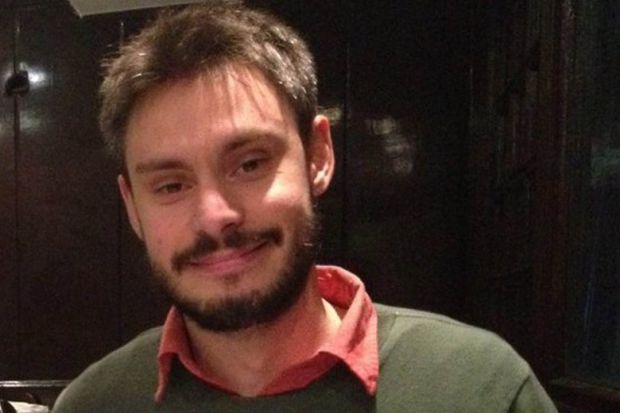The vice-chancellor of the University of Cambridge has condemned the “public campaign of denigration” against the doctoral supervisor of murdered student Giulio Regeni.
In a letter addressed to the academic community, Stephen Toope describes public speculation about Maha Abdelrahman’s involvement in the case as “inaccurate, damaging and potentially dangerous”.
Mr Regeni, who was in the second year of his doctorate researching Egyptian labour rights as a visiting scholar at the American University in Cairo, disappeared on the evening of 25 January 2016, the fifth anniversary of the Arab Spring uprising in Egypt.
His half-naked body was found dumped in a ditch beside a road on the outskirts of the city on 3 February that year. According to reports, he had been tortured for about a week – with beatings, stabbings and cigarette burns – before his death.
Dr Abdelrahman’s supervision of Mr Regeni, an Italian national, has been in the spotlight since a report in Italy’s La Repubblica newspaper suggested that had she commissioned Mr Regeni to write on a topic that she knew to be dangerous and that he was reluctant to pursue. This prompted an open letter to The Guardian, signed by 344 academics, defending Dr Abdelrahman.
Questions have also been raised about Dr Abdelrahman’s willingness to cooperate with the Italian police investigation into Mr Regeni’s death, but in the letter, Professor Toope describes Dr Abdelrahman as “an honourable and distinguished scholar”, adding that she had welcomed the opportunity to speak to Italian investigators last week and had voluntarily handed over material requested by them.
“Public speculation about Dr Abdelrahman’s involvement in the case has been inaccurate, damaging and potentially dangerous,” Professor Toope says. “It demonstrates a lack of understanding of scholarly aims and methods. It shows a failure to understand the intellectual relationship between a PhD student and his or her supervisor.
“It is not uncommon for academic research in the humanities and social sciences to impinge on politically sensitive issues. Giulio was an experienced researcher, who had already spent time in Egypt, and was a fluent Arabic speaker. He was using standard academic methods to study trade unions in Egypt.”
Dr Abdelrahman, an Egyptian scholar, joined the Cambridge Centre of Development Studies in 2007.
Professor Toope says that Dr Abdelrahman and the university have “repeatedly expressed their willingness to cooperate with the investigation”.
“In light of her willingness to assist, the public campaign of denigration, fanned by political expediency, is shameful,” Professor Toope says. “The university has sought all opportunities – public and private, formal and informal – to push for progress in the investigation into Giulio’s death. It has urged Egyptian, Italian and British authorities to pursue all avenues of investigation to arrive at the truth.
“Throughout, the university has been respectful of legal constraints (including on the ability to comment publicly) posed by the continuing legal process. It has been particularly disappointing, then, to see that the same restraint has not applied in other domains, where the confidentiality of the legal process has been blatantly ignored.”
Professor Toope adds that the university “will of course continue to assist authorities as they seek justice for Giulio and his family”.
He concludes: “This brutal killing calls for justice. But justice will not be served by undermining the very thing that drove Giulio in his brief but inspiring academic career – the search for truth.”
Register to continue
Why register?
- Registration is free and only takes a moment
- Once registered, you can read 3 articles a month
- Sign up for our newsletter
Subscribe
Or subscribe for unlimited access to:
- Unlimited access to news, views, insights & reviews
- Digital editions
- Digital access to THE’s university and college rankings analysis
Already registered or a current subscriber? Login





